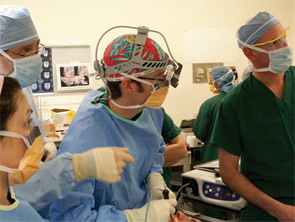On July 1, after five years in the department of otolaryngology-head and neck surgery at the University of California, San Francisco (UCSF) Medical Center, most recently as chief resident, Matthew Russell, MD, is joining the faculty there as an assistant professor. Normally, that career arc is not nationally noteworthy.
But Dr. Russell’s new job title—ENT hospitalist—is worth noting. In fact, it could be groundbreaking.
Hospital medicine, a term coined 15 years ago by two physicians at UCSF, refers to doctors who provide care solely to hospitalized patients. According to the Society for Hospital Medicine, there are approximately 30,000 hospitalists currently practicing in North America.
When Dr. Russell begins work this summer, he may be the only otolaryngologist in the country whose entire patient load and surgical pipeline will be generated only by admissions to his hospital. While there are already otolaryngologists around the country who spend the vast majority of their time working with inpatients, nearly all work a clinical service as well.
“The hospitalist model turns the traditional ENT practice on its head,” Dr. Russell said. “An otolaryngology practice we think of as being centered around the clinic, and the clinic and referrals is where we generate our operative cases and our patient load. The question really becomes: Can you sustain a practice without a clinic-based model?”
While the answer at UCSF appears to be yes, the otolaryngology world at large has not yet answered in unison.
Job Duties
Some physicians believe the least glamorous duties of medical otolaryngology, say, cleaning out ear wax to test hearing before an ototoxic medication regimen or responding to a general complaint of forehead pain, would make the workflow of an oto-hospitalist unappealing to many physicians.
Michael Seidman, MD, FACS, chair of the board of governors for the American Academy of Otolaryngology-Head and Neck Surgery (AAO-HNS), said the concept of so-called oto-hospitalists has yet to gain any traction within industry circles. He wonders if physicians would be “bored” handling fewer surgical responsibilities as they focused on more medical issues and consultations on other wards.
“I just can’t see that happening in ENT, and my colleagues have often credited my visionary character,” said Dr. Seidman, director of the division of otologic/neurotologic surgery and medical director of wellness for the Henry Ford Health System in Detroit, Mich. “I don’t see that happening, but maybe I’m wrong.”

Leave a Reply